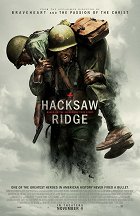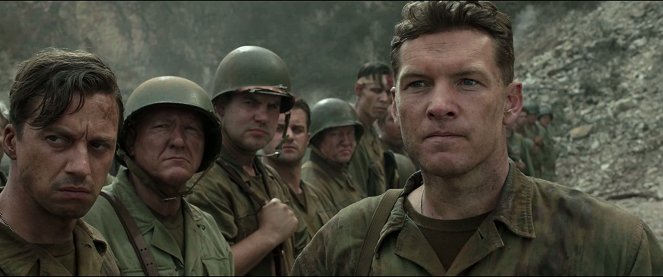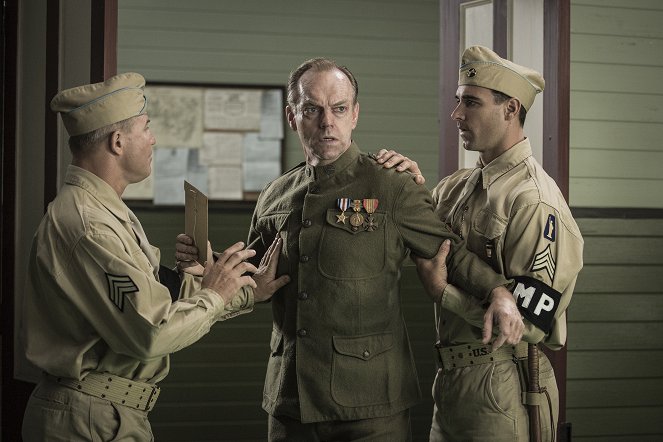Directed by:
Mel GibsonCinematography:
Simon DugganComposer:
Rupert Gregson-WilliamsCast:
Andrew Garfield, Vince Vaughn, Sam Worthington, Luke Bracey, Teresa Palmer, Hugo Weaving, Rachel Griffiths, Milo Gibson, Richard Roxburgh, Nathaniel Buzolic (more)VOD (4)
Plots(1)
The true story of Desmond Doss who, in Okinawa during the bloodiest battle of WWII, saved 75 men without firing or carrying a gun. He was the only American soldier in WWII to fight on the front lines without a weapon, as he believed that while the war was justified, killing was nevertheless wrong. As an army medic, he single-handedly evacuated the wounded from behind enemy lines, braved fire while tending to soldiers and was wounded by a grenade and hit by snipers. Doss was the first conscientious objector to ever earn the Congressional Medal of Honor. (Lionsgate US)
(more)Videos (18)
Reviews (16)
Gibson probably didn't quite understand the meaning of the phrase "war is hell/horror" and took it literally, word for word. He thus stylizes war scenes as a pure horror genre movie from hell with everything from the fear of the unseen through spooky scenes to the ultimate gorefest that cinema has never experienced before. Which is basically (without irony or exaggeration) a brilliant idea. On paper. In this interpretation, however, it is only a monotonously stultifying patchwork of slow-motion shots of Japanese Palachas melancholy flare accompanied by raining limbs. And all this improved with WTF moments that are like from the Army of Darkness (yes, a congenial assault with a rotting body, football-grenade scissors or "I´ll move forward you have my back"). And I haven't even yet mentioned the excessive agitation "overlap" that the viewer is forced to watch, which is packed with undisguised pathos (no, it's not a scene "please, one more"), that it has absolutely nothing in common with serious (anti) war drama. This is a regular B-rate guild "holy gore" pleasure not a serious movie. Which is a pity, because the fate and the themes (and the resulting conflicts) are so stimulating that they deserved a better and, above all, more dignified adaptation. But it wouldn't be so much fun, although unintentional, but damn it. At the end of the day, the main drawback is not the silly script, ridiculous performances or disrespecting the memory of the victims on both sides, but the first forty minutes, which ... Well, it´s just as bad (if not worse) than the rest of the movie, but there are no scenes from the Army of Darkness. Which is an unforgivable sin that not a dozen prayers will undo.
()
Gibson will cut you into pieces. It starts as romantic fairytale about human values and then switches over to hell. Doss’s story begins with a very fond view of the past, growing up, a fundamental faith in God all mixed with a complicated relationship with his father (the fantastic Hugo Weaving), a veteran of the First World War and a drunk. The romantic interest is dealt with precisely, somewhere between Forrest Gump and Braveheart, which is exactly what this story needs. The training centre section was a little confused, but as soon as the platoon sets foot on Okinawa, you no longer care. No pussyfooting from Gibson, he serves us reality in its fiercest form. He presents war in a terrifying, raw and very realistic way, but the sensitivity with which it was filmed gives it a stamp of beauty. The image composition is so fantastic it’s almost unbelievable, the same as the story. Heroic transfer of Doss’s wounded comrades, saving lives¬… sometimes even Japanese, hiding in tunnels and bloodbaths. Excellent casting, dominated by Garfield (a great balance between simple farmer and an ardent believer-hero). He does the work expected from him. This movie might never have been made if it wasn’t for Gibson’s Hollywood repentance, and that would have been a great shame. Now we want him back, ready for combat, and I hope that he dusts off that Viking bloodbath that he was meant to make with DiCaprio.
()
If the child version of Andrew Garfield had been hit in the mouth with a brick at the beginning of Hacksaw Ridge instead of his movie brother, the whole film would have made a lot more sense. I wasn’t really sure how seriously I should take a young man with the face of a divine simpleton who isn’t overly familiar with how interpersonal relationships work, let alone international politics. In any case, the film takes him seriously enough to gradually lose all credibility. Instead, it offers an enormous dose of stupidity. It seems to me that the final Assumption scene wandered into the film from an unaired Monty Python sketch. The concept that forms the basis of the entire film is reminiscent of the theatre of the absurd. To make the hero of the biggest explosion of disembowelled guts and blown-off heads since Saving Private Ryan a very devout pacifist who rejects violence of any kind strikes me as a rather cruel irony. It doesn’t seem, however, that Mel Gibson is aware of that. He doesn’t use the scenes of slaughter (which soon become numbing rather than shocking) to lead Desmond to the realisation that war is a lot more hellish than he imagined it would be (in which case the contrast of the first and second halves of the film would have worked better), but to show how hard the boy will have it if he wants to survive longer than a split second without a rifle in his hand. The creation of a hero who rejects violence is thus paradoxically conditioned by pervasive violence. If his buddies had not been torn to pieces by the bullets and grenades of the savage Japanese (an ethnic stereotype that went out of fashion along with John Wayne), he could not have become a hero. I don’t doubt that someone else will find clear logic in what I myself see as an irreconcilable contradiction, but even if it didn’t seem to me that the film is ridiculous at its very core, I would have a hard time finding reasons to recommend it to anyone as an example of the best of what has been made in Hollywood this year. We have seen powerful and generally uncluttered depictions of the pandemonium of war many times before, and the clear narrative structure and textbook segmentation, thanks to which such films never even start to be boring, are qualities that have characterised American films for many decades. Hacksaw Ridge, however, is somewhat underdeveloped both intellectually and formalistically. 60%
()
The rumors that Hacksaw Ridge is a cruel carnage have been confirmed. At least the scene when the protagonists enter the battlefield for the first time is really not for the faint of heart and will probably be talked about for a while. How the film will fare overall, though, I can't say, but I'm afraid a lot of viewers won't be able to stomach this. Mel Gibson is a great director and it shows here not only in the battle scenes, where he allows himself to do some really wild stuff from time to time, but audiovisually overall. The trouble, however, may be that Hacksaw Ridge looks like something from the last century, and not from the 1990s. The hero is more naive and passionate about a good cause than Forrest Gump, the characters are downright shallow at times, and everything here is either black (Dobbs, you're a naive idiot and you're going to get your ass kicked) or white (Dobbs, we'll follow you to hell). Gibson was probably trying to do just that, and if you accept the rules of the game, you get a very good hero story that you may question how much it has to do with reality, but you will enjoy it. But if you don't tune in to the director's wave, you can suffer through Hacksaw Ridge. So watch out!
()
Nothing has changed in all these years, Mel Gibson is still a very good storyteller of romantic and personal stories and relationship lines, but only mediocre at working with war themes. We Were Soldiers (where he left the direction to his mate Randall Wallace) had identical ills and became a mere semi-cult classic for loyal fans rather than a benchmark of the genre. Not even Mel's appetite for blood and blown limbs can make up for it. All he had to do was invite Spielberg or Stallone in for a consultation to show him what the meaning of the word dynamic and imaginative action/war scenes is. Everything is topped off by the traditionally idiotic slow-motion shots of the first line running out (again, as if copied from an earlier film), which subliminally scream "pathos" at the top of their lungs. The performances are fine, the Palmer-Garfield duo is ideal.
()



Ads